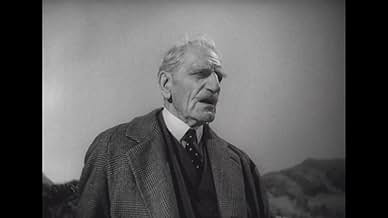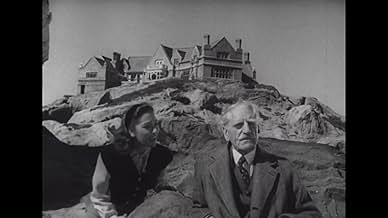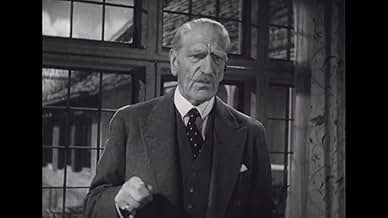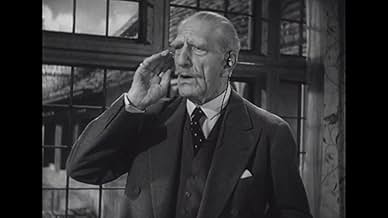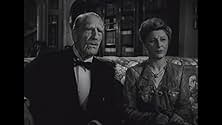VALUTAZIONE IMDb
7,4/10
17.683
LA TUA VALUTAZIONE
Sette ospiti, una segretaria appena assunta e due membri del personale sono riuniti in una casa padronale su un'isola isolata da un ospite assente sconosciuto e vengono uccisi uno per uno.Sette ospiti, una segretaria appena assunta e due membri del personale sono riuniti in una casa padronale su un'isola isolata da un ospite assente sconosciuto e vengono uccisi uno per uno.Sette ospiti, una segretaria appena assunta e due membri del personale sono riuniti in una casa padronale su un'isola isolata da un ospite assente sconosciuto e vengono uccisi uno per uno.
- Regia
- Sceneggiatura
- Star
- Premi
- 1 vittoria in totale
C. Aubrey Smith
- Gen. Sir John Mandrake
- (as Sir C. Aubrey Smith)
Recensioni in evidenza
This may be the best mystery ever put to film. If it isn't totally true to the letter of the Christie book, it is totally true to the spirit of her writing. Ten unique individuals are lured to an old house on a deserted Channel island. One by one - but I'll say no more. Very good acting, especially Fitzgerald. If you don't know the plot, you won't figure out whodunnit, despite the fact that it plays fair. There is suspense, good humor that holds up today, fine acting and a wonderful plot. Grab a cup of hot chocolate, turn the lights down, snuggle in the blanket, and prepare to enjoy a wonderful, cozy mystery which hasn't been equaled since.
This is a dramatization of the consummate Agatha Christie book, the benchmark for the whodunit. Each of the characters is nicely portrayed by accomplished actors. The pacing, the subdued dialogue, all make this film work, even though it was felt necessary to doctor the plot and rename characters (this I will never understand). I won't criticize because I've never felt that we should compare movies to books--they are different media--unless the plot is badly compromised. This one is not. I remember being really pleased as a young viewer that Christie is able to bring all issues to a resolution in a believable and realistic way--no hidden doors--no strange interventions. She is able to do this even in her lesser books. Sometimes it is preferable to not be open ended, leaving unfinished details. I relish this author and the movies and movie portrayals of her books.
I also need to mention the music. The score is so carefully tuned to the actions of the characters. The black and white photography lends itself well to the oppressiveness of the setting where the characters find themselves. You definitely should see this film.
I also need to mention the music. The score is so carefully tuned to the actions of the characters. The black and white photography lends itself well to the oppressiveness of the setting where the characters find themselves. You definitely should see this film.
Rene Clair's masterful direction takes Christie's classic novel up to a new dimension more suitable for cinema. Every character is perfectly realized by magnificent acting. My favorite is C. Aubrey Smith who portrays General Mandrake with a British subtlety that cannot be understood fully by today's American viewers. But why quibble?
Every cast member is perfect. Roland Young may actually be the most instrumental as Blore in keeping the films wit intact and never allowing it to get too serious. Barry Fitzgerald is terrific as the Judge, and Huston perfection itself as the charming, albeit alcoholic, doctor. Dame Judith Anderson, perhaps the best supporting actress of all time, dominates every seen she is in as a sinister spinster.
But, of course, there is a lead, and in the hands of a lesser actor, he could have wound up being a feckless straight man to all the great character actors around him. With Louis Hayward as Mr. Lombard, the character more than holds his own with all challengers, and has an especially nice chemistry with Young. And although June Duprez is slightly out of her league as a thespian, she is plucky and capable enough, with Hayward's help, to pull off her role just fine.
The atmosphere, photography, and soundtrack are all artistic perfection. This movie is a true treat for all the senses.
Every cast member is perfect. Roland Young may actually be the most instrumental as Blore in keeping the films wit intact and never allowing it to get too serious. Barry Fitzgerald is terrific as the Judge, and Huston perfection itself as the charming, albeit alcoholic, doctor. Dame Judith Anderson, perhaps the best supporting actress of all time, dominates every seen she is in as a sinister spinster.
But, of course, there is a lead, and in the hands of a lesser actor, he could have wound up being a feckless straight man to all the great character actors around him. With Louis Hayward as Mr. Lombard, the character more than holds his own with all challengers, and has an especially nice chemistry with Young. And although June Duprez is slightly out of her league as a thespian, she is plucky and capable enough, with Hayward's help, to pull off her role just fine.
The atmosphere, photography, and soundtrack are all artistic perfection. This movie is a true treat for all the senses.
All right, I'm not going to bother with the movie's strengths, as they are covered by every other reviewer here. What I want to talk about is the one area where I think director Rene Clair missed the boat: mood.
The book is absolutely chilling, and manages to have you jumping at noises in the night far better than most any of today's attempts at horror writing. The movie, however, has a campy, needlessly humorous feel which detracted strongly from my enjoyment. An example? Casting Harry Thurston as the boatman. His is one of the first faces we see, and it is twisted into the best version of a Bud Abbott facial expression that he could muster. Mischa Auer's performance was ridiculous to the extreme, and made his character neither believable nor endearing. There are a few other gripes I have, but they're of the same ilk, so I'll just say that this reasonably faithful portrayal could have been one of the greatest mystery thrillers ever if it had been taken a little more seriously.
The book is absolutely chilling, and manages to have you jumping at noises in the night far better than most any of today's attempts at horror writing. The movie, however, has a campy, needlessly humorous feel which detracted strongly from my enjoyment. An example? Casting Harry Thurston as the boatman. His is one of the first faces we see, and it is twisted into the best version of a Bud Abbott facial expression that he could muster. Mischa Auer's performance was ridiculous to the extreme, and made his character neither believable nor endearing. There are a few other gripes I have, but they're of the same ilk, so I'll just say that this reasonably faithful portrayal could have been one of the greatest mystery thrillers ever if it had been taken a little more seriously.
Why quibble about the ending? I know it's not the same as the book's final scene, but since Agatha Christie herself changed it for the stage version--sensibly (because the book's ending doesn't work dramatically)--there's no reason to feel cheated. It's still one of the cleverest ideas for a mystery--ten people invited to an old house by the sea so that an unknown host can dispose of them one by one. Under Rene Clair's direction, there's a great deal of humor thrown in. Add to that, enjoyable performances from a first-rate cast of character actors--Barry Fitzgerald, Judith Anderson, Walter Huston, Louis Hayward and the always dependable Richard Haydn as Rogers, the butler. June Duprez is the only weakness in the cast members, showing little emotion throughout. The atmosphere is brooding, the chills are delicious, and you can rewind your VHS print to spot Agatha's give-aways. One of the best mysteries of all time, but don't waste your time on the later remakes. This version is the genuine product.
Lo sapevi?
- QuizThis movie, while officially based on the novel by Dame Agatha Christie (as per the onscreen credits)], has an ending that resembles her later stage version. While the identity of the murderer is the same in both versions, the survivors of the tale in each are different.
- BlooperIn a flashback, Mr. Owen kills the seventh victim, takes a drink from a flask, and then tosses the flask away, leaving the stopper open. However, when two characters find the flask the next day, the stopper is closed.
- Citazioni
Emily Brent: Very stupid to kill the only servant in the house. Now we don't even know where to find the marmalade.
- Curiosità sui creditiThe first line of the nursery rhyme appears onscreen - "Ten Little Indians Went Out To Dine...." - superimposed over a set of small statues of Native Americans - this is immediately followed by the film's title "And Then There Were None".
- Versioni alternativeA computer colorized version of this film, made in the late 1980s, also exists.
I più visti
Accedi per valutare e creare un elenco di titoli salvati per ottenere consigli personalizzati
Dettagli
- Tempo di esecuzione1 ora 37 minuti
- Colore
- Proporzioni
- 1.37 : 1
Contribuisci a questa pagina
Suggerisci una modifica o aggiungi i contenuti mancanti

Divario superiore
By what name was Dieci piccoli indiani (1945) officially released in India in English?
Rispondi


